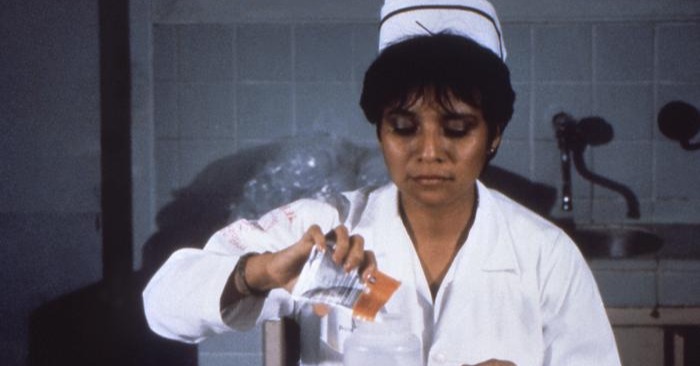
What is an MBA in Healthcare Management?
An MBA with a Healthcare Management concentration can equip you [...]

In a sector where deviation from an established workflow can be deadly, the adoption of technology in healthcare has been bumpy, to say the least. This highly regulated industry is notoriously slow to adopt new trends and is often bogged down in tight regulations.
In recent years, however, things have started to change. In 2014, the federal government passed the American Recovery and Reinvestment Act, which stipulated that all medical and healthcare providers that bill Medicaid and Medicare must prove “meaningful use” of electronic health records (EMRs) or face severe penalties.
As a result, clinicians can now track patient records simply and securely, adding pharmacy records, test results, X-rays, and even vital signs to a virtual chart that’s easy to read, share, and check against other databases.
Along with changes to clinical records, many healthcare organizations have used data analytics tools to create a more detailed picture of the populations they serve. Many have established expansive databases—some with billions of data points—encompassing complete, detailed pictures of patients and treatments, medical research findings, practice guidelines, and administrative data from billing and insurance claims.
As technology use in hospitals, clinics, and private practice continues to expand, information technology (IT) is used in an ever-increasing number of ways to improve healthcare delivery and patient safety and as well as to reduce the cost of care. Simultaneously, the role of chief medical information officer (CMIO)—one of the newest members of the healthcare c-suite—has emerged to bridge the gap among IT, clinical, and frontline staff.
So, what is a chief medical information officer? We’ll get to that question and also cover the following topics:
While CMIO responsibilities vary from one healthcare institution to another, the work is primarily focused on effectively leading the strategic implementation of clinical information systems, particularly as they apply to physicians, nurses, and other clinical staff.
As an integral part of their organization’s senior leadership team, the CMIO may handle any or all of the following duties:
Some CMIOs are highly experienced IT professionals with specialized training. Physicians with a background in technology also fill this role at some institutions. In a 2019 compensation survey from the Association of Medical Directors of Information Systems (AMDIS) of 172 practicing CMIOs, 61 percent of respondents reported having eight or more years of clinical experience.
CMIOs generally report to their organization’s chief information officer (CIO). However, depending on the structure of their management team, the CMIO may report to their chief executive officer (CEO), chief operating officer (COO), or another C-level role.
The Bureau of Labor Statistics (BLS) has yet to publish specific data on the employment of chief medical information officers. However, it does provide information for medical and health services managers, of which CMIOs make up an occupational subsector.
In 2018, the largest employers of medical and health services managers were as follows:
Professionals who choose careers as chief medical information officers typically have strong communication skills. They need these to help their colleagues understand the complexities of clinical technology systems while simplifying how they can be successfully implemented and used in a meaningful way.
Chief medical information officers don’t necessarily need an in-depth knowledge of coding or troubleshooting IT systems. Still, they must have sound computer skills to inform and lead IT teams effectively. This includes an understanding of significant trends in healthcare and managed care as well as familiarity with point-of-care products and medical informatics tools.
Since dealing with data is at the core of CMIO careers, these professionals must be well-versed in data analytics. They must know when a particular data set is reliable or unreliable in informing the decisions of executives, managers, and other relevant stakeholders. Creativity is critical, too, in enabling them to look at a situation and investigate it deeply, understand root causes and issues, and then use that information along with data appropriately to solve problems.
Lastly, they must have leadership skills and solid practical experience. These enable a CMIO to take a broader view and understand how specific clinical technologies align with frontline care providers as well as their organization’s strategic goals.
Since the field of medical information is a relatively new one, the educational qualifications required to become a chief medical information officer vary from one organization to the next.
Many healthcare facilities prefer licensed physicians who have practiced medicine for at least five years. Starting in the field requires candidates to complete a four-year bachelor’s degree in biology or pre-medicine, followed by a four-year MD degree program and medical residency.
Other employers consider other medical professionals, including nurses and IT specialists with extensive training in health informatics. Some candidates pursue a master’s degree in healthcare administration or health informatics to make them more competitive in the job market.
The Master of Science in Health Informatics program at the University of Pittsburgh and the Master of Health Administration track at New York University are great starting points for both students who are interested in pursuing this field. They also serve well physicians who are looking to enhance their effectiveness as medical professionals with IT skills.
While CMIOs don’t typically need professional certifications—save for physicians who are board-certified in their field of medical specialty—some may pursue credentials to boost their credibility and demonstrate their commitment to understanding and excelling in their profession.
Some of the professional credentials chief medical information officers may pursue include:
Once again, this role is fairly new, making it hard to pin down an exact salary for chief medical information officers. The BLS notes medical and health services managers made a median annual wage of $99,730 in 2018, with the highest 10 percent of earners pulling in more than $182,600.
Glassdoor data, on the other hand, paints a much more lucrative picture, indicating that CMIOs made an average salary of $264,562 in 2019.
AMDIS’ 2019 CMIO Compensation Report also provides more information on earnings in this field. Out of the 172 practicing chief medical information officers the organization surveyed, nearly 47 percent of respondents reported that they’d pulled in an annual base salary between $251,000 and $350,000 in 2018. The majority of respondents in this salary range reported a bonus potential between 5 and 30 percent
The next largest group of respondents, about 33 percent, made $351,000 to $450,000 in base salary. About 13 percent earned under $250,000, and just under 8 percent earned more than $451,000.
It’s too early in the emerging sector for the BLS to track CMIO jobs yet. The job outlook for medical and health services managers is projected to grow 18 percent by 2028, much faster than the average for all occupations.
Within this broader occupational category, the BLS indicates that employment is projected to grow in offices of health practitioners and hospitals. Demand in medical group practice management is also projected to grow as medical group practices become larger and more complex.
There’s no doubt that healthcare has made some incredible strides compared to previous decades when it comes to clinical technology. Today the healthcare IT industry is growing rapidly, enabling a future in which data-led decision-making and evidence-based clinical technologies become part of medical practices’ operational routine.
With advancements in data processing, machine learning, and cloud-based technologies happening at a faster speed than ever, healthcare organizations are increasingly calling on CMIOs to reduce the friction in how, when, and where to use new technologies within the healthcare system.
At the same time, breakthroughs in technology are not the only thing needed for progress in the field. Professionals who can creatively leverage the power of new technologies rather than trying to insert them into an existing framework are likely to be highly sought-after as more technology moves into the healthcare space.
It may be difficult to imagine a healthcare industry in which the process of developing new drugs is lighting-fast and inexpensive or virtual reality is used to treat and cure rare diseases and conditions, but that’s the future. And as any CMIO will tell you, choosing to bolster a healthcare career with a side of expertise in technology is a pretty good way to start down that path before the path has even materialized.
Questions or feedback? Email editor@noodle.com

An MBA with a Healthcare Management concentration can equip you [...]

Job prospects are sparse during any recession. Graduate school offers [...]

A information technology master's degree can position you for management [...]

Healthcare management in the U.S. is exceedingly complex. Medical facilities [...]

A Doctor of Nursing Practice (DNP) degree qualifies you for [...]
Categorized as: Health Informatics & Sciences, Nursing & Healthcare